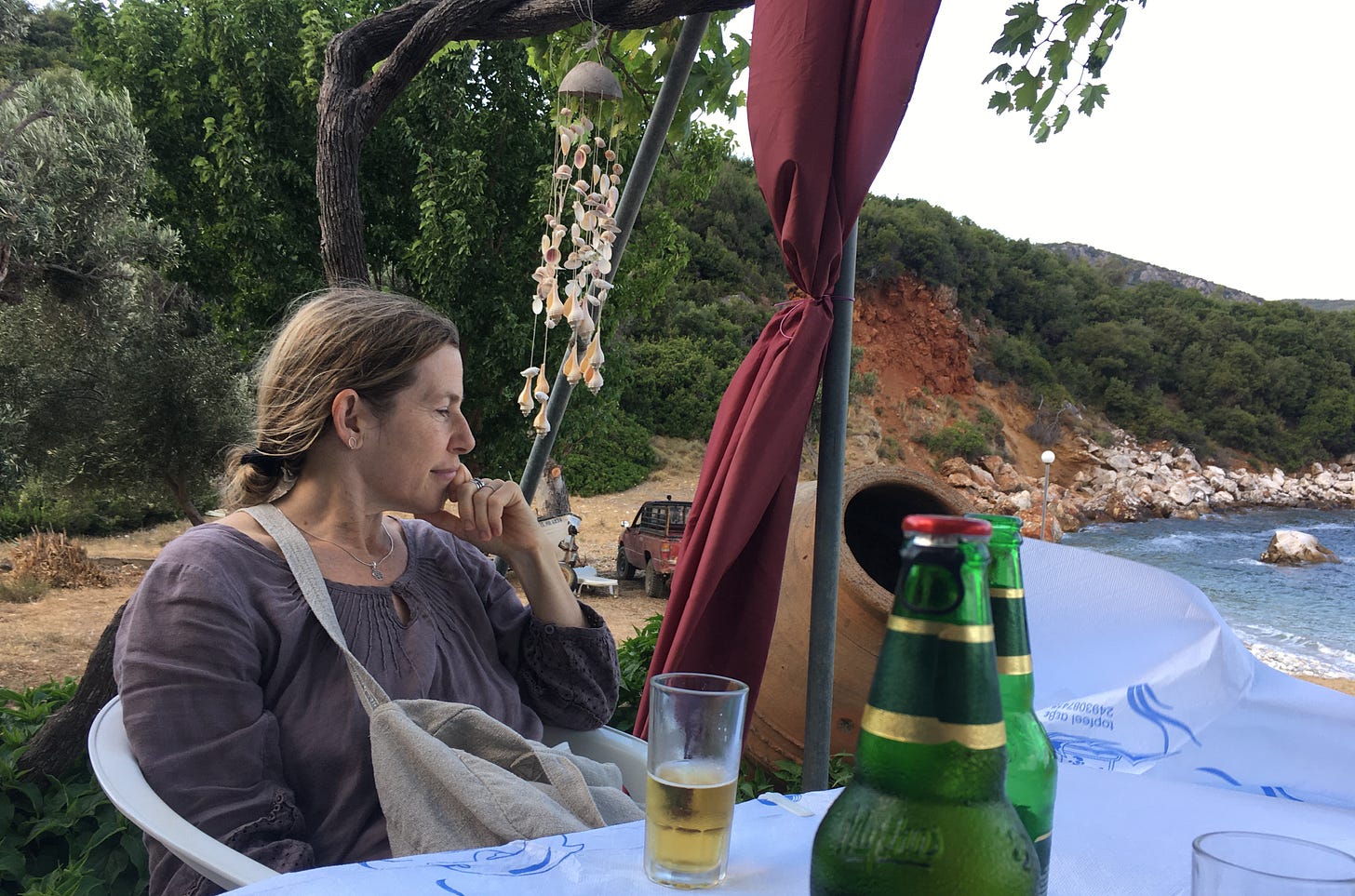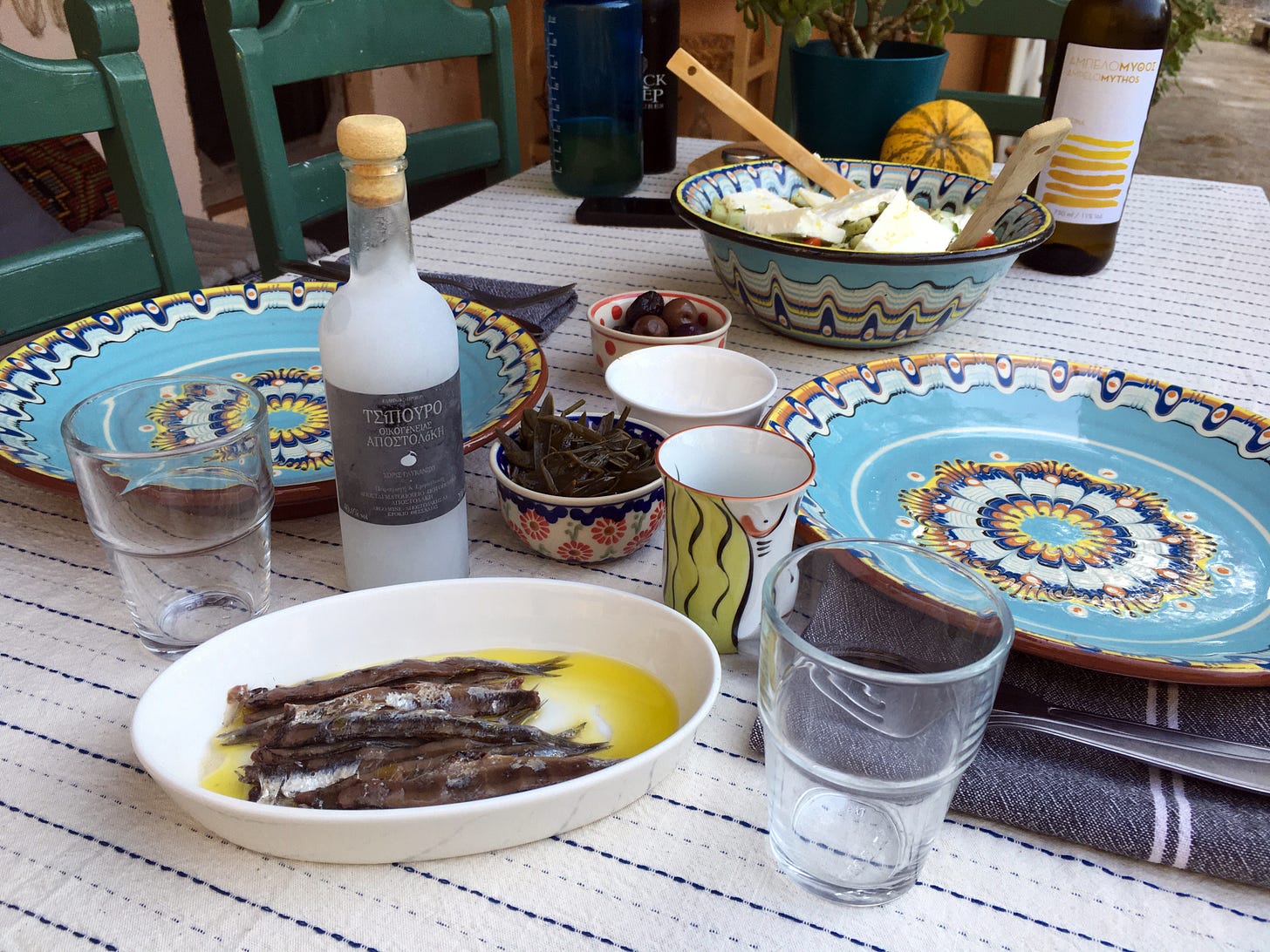Several weeks ago, after telling them I was moving from Bulgaria to Greece, an editor asked if I had time to take on some additional work. Before I could reply, they answered their own question:
“Oh, of course you don’t want more work. You’re going on vacation for the summer.”
Me: “Uhhh … I am?”
Editor: “Aren’t you? You did say you’re going to Greece.”
Me: “Ahhh, yes, I see.”
I get it. For both Americans and Europeans, mentions of Greece evoke visions of lazing around on a rocky beach sipping frappes and occasionally dipping into the warm, blue-green waters of the Aegean to cool off. And I would certainly like to be on eternal vacation, able to spend every afternoon in a Taverna, sipping on some Tsipouro and eating salty snacks, but I haven’t won the lottery. Yet.
Greece ain’t no vacation. It’s life—in a pretty nice place, to be sure—but still just life. In fact, thanks to the Land Desk, a gig with the Energy News Network, my work with High Country News, preparing to launch a book tour, and some big freelance projects on top of that, I am working as much as ever, which is saying something. And I’m certainly not alone. We live in an area that relies on tourism and agriculture, and farming and dealing with tourists is hard work, especially in the summer.
For me it’s the same ol’ eight-to-five grind, Monday through Friday (and during our first few weekends, I was assembling IKEA furniture and working on the house on Saturday and Sunday). Wendy, meanwhile, has been working on the house and on wrestling with the tangle of bureaucracy that comes along with moving to another country.
But the work does come with some mighty fine benefits, to be sure: A dog-walk or run through olive groves at sunrise to start the workday; typing away to the squeaky hum of cicadas; heading out after work to take a dip in the sea.
***
We live just outside a tiny village called Koukouleika. There’s a guy here who sells fish and occasionally a truck comes through selling produce. But other than that it’s devoid of tavernas or markets, meaning we have to go to one of the larger nearby villages for supplies.
On Saturdays we head up to Argalasti, which is about 20 minutes away and is a couple of miles inland and up on a plateau, removed from the touristy beach towns. It’s more of a working town and a supply town for the surrounding area. Every Saturday it has a farmers market, with folks selling produce and fruit and olives and herbs and cheap shoes and clothes and tools. Everyone in South Pelion—or so it seems—converges on Argalasti for the Saturday market, us included, and then we all sit in the town square and drink Greek coffee and eat cheese pies. The crowd is made up of locals along with tourists from Greece, Germany, France, the Netherlands, and a couple of American Ausländer.
A little grocery store sits on one corner of the square, run by an old guy and his son. The shelves are stocked with local wines, provisions, olive oil in bulk, and the snacks one eats while drinking tsipouro—a local tradition. We wanted to try out the ritual, so stopped in and picked up some salt-cured anchovies and sardines and learned how to prepare them, along with some kritama, a plant that grows by the sea and that is pickled in vinegar and salt. And, of course, a bottle of homemade tsipouro, a high-potency spirit that comes with or without anise.
In Bulgaria, you drink rakia with your shopska salad. In the Pelion, you drink tsipouro with salty snacks.
***
When we got home, we tried to do our routine dip in the sea, but it was disrupted. By jellyfish. They were little, about the size of an Oreo, but that made them no less terrifying for this drylander.
“I’m not going in there,” I said.
“There’s only a few.”
“I’m not going in there!”
From what we can tell, the jellyfish kind of move around from place to place and it was our little bay’s turn. But we really wanted to go in the sea, so we figured we’d go try the other side of the peninsula, which is only a few kilometers away. We had seen a little hand-painted sign pointing up a little dirt road. It said “Taverna Aigaio, 3.5 km.”
“Let’s go see what that’s like.”
The road was dusty and rocky, not unlike something I’d drive down in Southeastern Utah to get to the prime car-camping spot. Only it was through olive groves, of course and then an almost savannah-like glade in the shadow of a steep limestone outcrop. The signs led us onto a steep, narrow side road dropping to the sea. At its terminus was a house with some old cars in the yard and a girl—probably about 12—along with her huge black dog, both looking at us curiously.
“Taverna?” Wendy yelled.
“Yes, yes,” the girl, Constantina, black hair and blue eyes, answered.
“Mythos?” Wendy asked (Mythos is a Greek beer, and we didn’t have enough cash for much else).
“Yes, yes.”
We hopped out of our little Fiat Panda, dragging Lada, our Bulgarian stray, out of the back seat. The black dog, his head the size of a basketball, charged us. I may have screamed a little, but there was no need: The dog was harmless, except for his rapidly wagging tail, which dealt a mean blow.
We sat down on the taverna’s patio, where an older, portly man lounged and smiled lazily. The family’s clothes—blouses, underwear, pants—hung from a rope between two poles where one might expect to see octopi tentacles drying out in the sun. We sat down at one of the plastic tables, which Constantina covered with the requisite paper table cloth. The sun slipped behind the occasional cloud. The Aegean Sea, teal-colored, was in one of her moods and waves crashed against the cliffs. Wendy was in one of her moods, too, and sat back and smiled one of her fetching smiles, as she is prone to do these days.
Greece ain’t no vacation. It’s just life. But it’s a pretty sweet one, indeed.






Sounds like a very peaceful place - now get back to work!